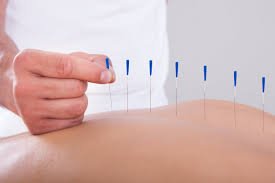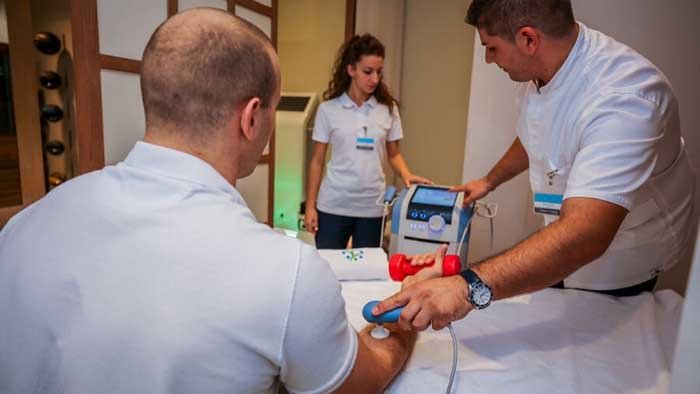ACUPUNCTURE THERAPY

ACUPUNCTURE THERAPY:
Acupuncture therapy is a traditional Chinese medicine practice that involves inserting thin needles into specific points on the body to promote healing and balance. What makes acupuncture unique is its holistic approach, integration of ancient traditions with modern practices, and various applications. Here are some key aspects that highlight the uniqueness of acupuncture therapy:
1. Holistic Approach to Health
- Mind-Body Connection: Acupuncture considers the interconnectedness of the body, mind, and spirit. It aims to treat the root cause of health issues rather than just alleviating symptoms.
- Balance of Qi: The practice is based on the concept of Qi (pronounced “chee”), which is considered the life force or energy that flows through the body. Acupuncture seeks to balance this energy to promote overall health and well-being.
2. Individualized Treatment
- Personalized Care: Acupuncturists assess each patient’s unique symptoms, lifestyle, and emotional state to develop a tailored treatment plan. This individualized approach can address a wide range of health concerns.
- Comprehensive Diagnosis: Practitioners often use traditional diagnostic techniques, such as pulse and tongue diagnosis, to understand the patient’s condition more deeply.
3. Wide Range of Applications
- Pain Management: Acupuncture is widely recognized for its effectiveness in treating various types of pain, including chronic pain, migraines, arthritis, and back pain.
- Stress Reduction and Mental Health: It can help reduce stress, anxiety, and depression by promoting relaxation and enhancing emotional well-being.
- Digestive Disorders: Acupuncture is used to treat gastrointestinal issues like irritable bowel syndrome (IBS), acid reflux, and nausea.
4. Minimal Invasiveness
- Non-Pharmacological Treatment: Acupuncture offers a drug-free approach to health care, making it an appealing option for those who prefer to avoid medications or have concerns about side effects.
- Safe and Generally Well-Tolerated: When performed by a qualified practitioner, acupuncture is considered safe with minimal side effects. The needles used are extremely fine and often cause little to no discomfort.
5. Integration with Western Medicine
- Complementary Therapy: Acupuncture can be integrated into conventional medical treatments, providing complementary support for various conditions and enhancing overall treatment effectiveness.
- Evidence-Based Research: Increasing research supports acupuncture’s efficacy for various health conditions, contributing to its acceptance in mainstream healthcare settings.
6. Emphasis on Prevention
- Preventative Healthcare: Acupuncture is often used for preventive purposes, helping individuals maintain balance and health before issues arise.
- Lifestyle and Dietary Guidance: Acupuncturists may also offer advice on lifestyle changes, diet, and self-care practices to enhance the benefits of acupuncture.
7. Diverse Techniques and Modalities
- Variety of Techniques: In addition to needle insertion, acupuncture practitioners may employ techniques like moxibustion (burning dried mugwort near acupuncture points), gua sha (scraping the skin), and cupping to enhance treatment effects.
- Electro-Acupuncture: This modern adaptation involves attaching small electrical currents to the needles to stimulate acupuncture points further, often used for pain management and muscle relaxation.
8. Cultural Significance and Tradition
- Ancient Practice: Acupuncture has a rich history that dates back thousands of years, deeply rooted in Chinese cultural and philosophical traditions. This historical context adds to its uniqueness and depth.
- Global Adaptations: While originating in China, acupuncture has been adapted and practiced worldwide, resulting in variations and the integration of different techniques from various cultures.
9. Patient Empowerment
- Active Participation: Patients are often encouraged to take an active role in their health and healing process, fostering a sense of empowerment and responsibility for their well-being.
- Self-Care Strategies: Practitioners may teach self-acupressure techniques or mindfulness practices to help patients manage their health between sessions.
10. Focus on Long-Term Wellness
- Chronic Condition Management: Acupuncture is particularly effective for managing chronic conditions, providing long-term relief and promoting overall health and wellness.
- Continuous Treatment: Many patients engage in ongoing acupuncture treatments as part of their wellness routine, contributing to sustained health benefits.
Acupuncture therapy’s unique blend of ancient traditions, holistic principles, and individualized care makes it a valuable option for many people seeking to improve their health and well-being.
THERAPEUTIC EXERCISE
Physiotherapy exercises have been scientifically proven to be one of the most effective ways that you can solve or prevent pain and injury.
Get Fast & Effective Physiotherapy Treatments
- Exercise program focuses on regaining range of motion and rebuilding muscle strength and endurance.
- Help the body reduce pain and inflammation.
- Return an injured patient to a fully functioning, pain-free state.
- Restore & maintain strength, endurance, flexibility, stability, and balance.


At Active Care BD, we offer life-changing physiotherapy specialties & techniques.
- We treat patient’s condition, not just the symptoms.
- We apply the most effective physical therapy techniques.
- We use latest physiotherapy equipment & technology.
- We work as a team to ensure you regain a better lifestyle.
- We ensure patients’ comfort, safety, privacy, and dignity.
BOOK YOUR CONSULTATION
Enter your details below and we will follow up with you to book your appointment.
SCHEDULE YOUR APPOINTMENT
Submit your info to confirm your appointment
FREQUENTLY ASKED QUESTIONS
Learn commonly asked questions about our physiotherapy services.
Active Care BD is enriched with advanced medical equipment and here the Physiotherapists are skilled with different manual techniques that help you in quick pain relief.
Most of the Physiotherapy treatments are not painful but in some cases, for example, shock Wave therapy is a bit unpleasant in early 1 or 2 sessions.
It depends on the severity of the condition. Most of the cases require 8-10 sessions.
The treatment session needs approximately 45 minutes.
You will be happy to know that there are no side effects of physiotherapy treatment.
